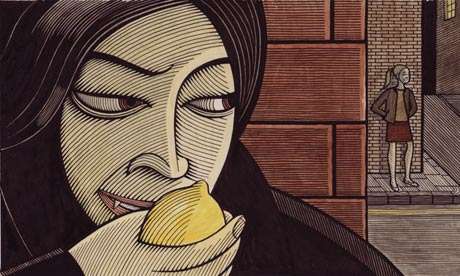Karen Russell’s new book of stories titled Vampires in the Lemon Grove, published in February 2013, is preceded by a slew of positive reviews and awards from her past publications. With Vampires, Russell once again demonstrates her drive to challenge herself and push the boundaries of her prose and genre.
For her first set of stories, St. Lucy’s Home for Girls Raised by Wolves (2006), Russell was named one of the National Book Foundation’s top “5 under 35” in 2009, and won the Bard Fiction Prize in 2011. However, it was her debut novel, Swamplandia! (2011)—for which she became a finalist for the Pulitzer Prize for Fiction in 2012—that secured her reputation as a master of prose and a moving storyteller. When the Chicago Tribune asked her about the influence of literary awards on her work, Russell humbly replied, “I think it’s good to be held to a really high standard. It’s wonderful to have this impetus to do good work and feel challenged to push into new frontiers.”
In this collection of eight unified stories, Russell inhabits diverse human and animal perspectives from around the world. She writes these characters with a level of cultural detail that a reader couldn’t possibly verify without travelling to these distant countries, boarding with a local family, and maybe spending a decade in each one.
In addition to her rich settings and personae, Russell’s prose begs to be read slowly and enjoyed; her language contains all the poetry and mysticism of a haiku. In each sentence, words are arranged in inventive ways so that magic seems to ooze from the cracks between the real and the solid.
Likewise, her plots and story set-ups tend to combine realistic problems with streaks of magical intervention. One may reasonably wonder how Russell is able to so fully imagine and transmit the visceral experience of transforming from a young girl into an enslaved worm in a Japanese silk factory, as she does in “Reeling for the Empire.”
With empathic grace, Russell lights up her stories using international, cross-gender, and cross-species experiences tied together by the thread of forgiveness from past guilt. Russell is an expert at targeting pivotal moments in her characters’ emotional evolution and colouring them, pushing them to tension until they buzz. She ends each story with a single sentence that provokes multiple questions inside the reader’s head: What is freedom? What are we bound by? Are we defined by our pasts? Whom and what do we live for?
Russell plots her animals in the trajectory of guilt and forgiveness. In almost every story, the animal’s characteristics cause it guilt yet, when seen in a different light, they allow the animal to free itself through forgiveness. In the opening story “Vampires in the Lemon Grove,” an ancient immortal vampire bat regrets his blood-drinking youth; and after discovering that he does not need blood, he instead goes to live off of a lemon grove in Italy. In another story, the former American presidents have become horses that are trapped in a pen (possibly in heaven) but can jump over the low fence once they are mentally strong enough. Russell’s collection of stories is unified through themes of guilt and transformation, and animal symbolism.
With her final story, “The Graveless Doll of Eric Mutis,” the Florida-born Russell roots herself in the North American literary tradition alongside writers like Toni Morrison and Margaret Atwood, who explore memories of childhood bullying to take an unabashed look at guilt and repentance. In this piece, schoolboy Larry Rubio teases, shames, and beats up another student, Eric Mutis, who is “paler than a cauliflower” and has a questionable home environment. The final image is of Rubio’s effigy of Mutis, “Mutant,” made of a found scarecrow and a pet shop white rabbit. Rubio looms over the makeshift shrine and concludes, “Somewhere I think I must still be standing, just like that.”
By the end of the collection, Russell has melted her imaginative tales into a wonder that crosses from her fiction into the reader’s world. The things that are identified as magical in her book translate to the invisible, emotional forces of memory and transformation, guilt and forgiveness. As promised, Russell extends her prose and genre to create an imaginative collection of short stories in which creativity meets empathy.








